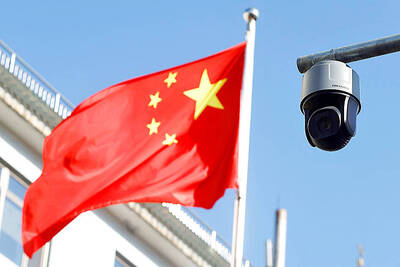Taiwan has lifted a ban on international cruises that was introduced in February 2020 to prevent the spread of COVID-19 into the country, the Maritime and Port Bureau said on Monday.
The ban was lifted, effective on Monday, because Taiwan had ended mandatory quarantine for all overseas arrivals on Oct. 13, and cruises have gradually returned around the world, the bureau said.
Taiwan is looking forward to a swift resumption of international cruise services, which would help the industry resume the growth it was seeking to develop before the COVID-19 pandemic began, the statement said.

Photo courtesy of Princess Cruises
Earlier on Monday, the Central Epidemic Command Center approved new protocols for cruises drafted by the Ministry of Transportation and Communications, and they have been sent to cruise operators, the bureau said.
The new protocols were drafted based on similar rules introduced by the EU, the US and Australia, and would require cruise passengers to present a negative rapid COVID-19 test taken on the day of arrival in Taiwan or the previous day, the bureau said.
However, passengers who display COVID-19 symptoms on the day of arrival would have to produce another negative rapid test result before they are allowed entry.
Children younger than two are exempt from the rapid test requirement, the bureau said.
There are also vaccination and insurance recommendations.
All passengers are advised to receive the most recent COVID-19 vaccine booster dose recommended for them at least 14 days before they begin a cruise, and visitors to Taiwan are advised to buy a travel insurance plan that covers overseas medical care, the bureau said.
Crewmembers working on cruise ships based in Taiwan are required to have received a booster shot at least 14 days before they start working on a vessel, and all cruise liners have to submit a health declaration form before arriving at a port in Taiwan.
Passengers with COVID-19 will have to quarantine on board the vessel, while those who develop a severe infection would be taken to a hospital, it said.
Cruise ships will have to comply with instructions from Taiwanese authorities if cluster infections are found on board.
Among the potential responses are adopting tighter disease prevention rules, limiting onshore visits by passengers and changing the ship’s course, the bureau said.
The ban was introduced on Feb. 6, 2020, after a Taiwanese woman traveling on the Diamond Princess cruise liner was confirmed to be one of the 10 passengers infected with COVID-19 — the second wave of infections on the ship when it arrived in Japan on a round-trip cruise that included a 10-hour stop in the Port of Keelung on Jan. 31.
International cruise ships have been put into service in Taiwan during the pandemic, but they have been used until now for domestic cruise trips around Taiwan proper or to the outlying islands of Kinmen, Penghu and Matsu.

POLAM KOPITIAM CASE: Of the two people still in hospital, one has undergone a liver transplant and is improving, while the other is being evaluated for a liver transplant A fourth person has died from bongkrek acid poisoning linked to the Polam Kopitiam (寶林茶室) restaurant in Taipei’s Far Eastern Sogo Xinyi A13 Department Store, the Ministry of Health and Welfare said yesterday, as two other people remain seriously ill in hospital. The first death was reported on March 24. The man had been 39 years old and had eaten at the restaurant on March 22. As more cases of suspected food poisoning involving people who had eaten at the restaurant were reported by hospitals on March 26, the ministry and the Taipei Department of Health launched an investigation. The Food and

The long-awaited Taichung aquarium is expected to open next year after more than a decade of development. The building in Cingshui District (清水) is to feature a large ocean aquarium on the first floor, coral display area on the second floor, a jellyfish tank and Dajia River (大甲溪) basin display on the third, a river estuary display and restaurant on the fourth, and a cafe and garden on the fifth. As it is near Wuci Fishing Port (梧棲漁港), many are expecting the opening of the aquarium to bring more tourism to the harbor. Speaking at the city council on Monday, Taichung City Councilor

A fourth person has died in a food poisoning outbreak linked to the Xinyi (信義) branch of Malaysian restaurant chain Polam Kopitiam (寶林茶室) in Taipei, Deputy Minister of Health and Welfare Victor Wang (王必勝) said on Monday. It was the second fatality in three days, after another was announced on Saturday. The 40-year-old woman experienced multiple organ failure in the early hours on Monday, and the family decided not to undergo emergency resuscitation, Wang said. She initially showed signs of improvement after seeking medical treatment for nausea, vomiting and diarrhea, but her condition worsened due to an infection, he said. Two others who

Taiwanese should be mindful when visiting China, as Beijing in July is likely to tighten the implementation of policies on national security following the introduction of two regulations, a researcher said on Saturday. China on Friday unveiled the regulations governing the law enforcement and judicial activities of national security agencies. They would help crack down on “illegal” and “criminal” activities that Beijing considers to be endangering national security, according to reports by China’s state media. The definition of what constitutes a national security threat in China is vague, Taiwan Thinktank researcher Wu Se-chih (吳瑟致) said. The two procedural regulations are to provide Chinese